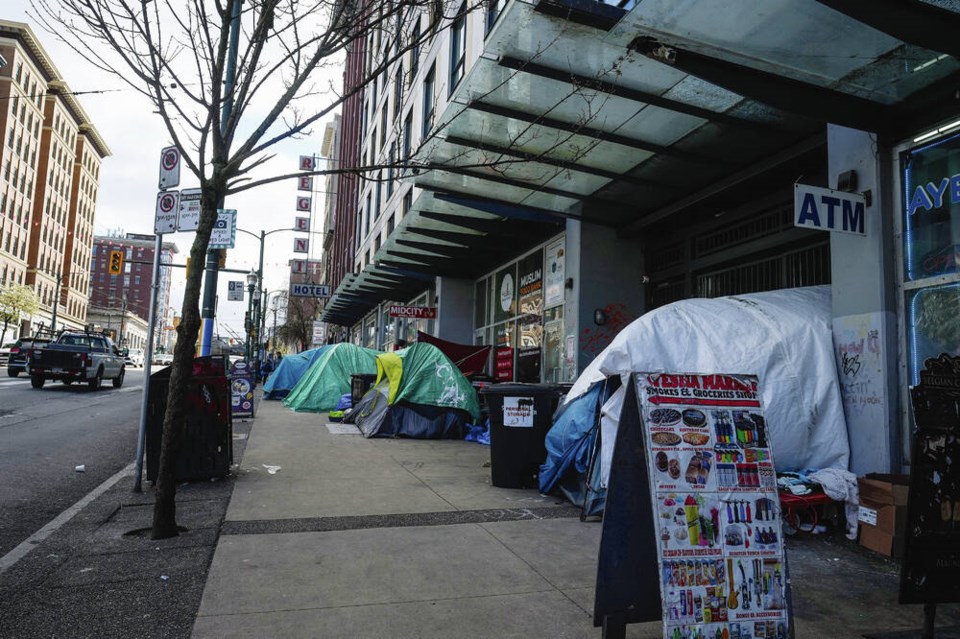A commentary by a Victoria resident.
Re: “,” letter, April 28.
Wokeism is the wrong place to look for root causes of today’s homelessness crisis.
Actual root causes are: shutting down mental health institutions in the 1960s and 1970s, culminating in closing Riverview in 2012, without putting adequate replacement mental health treatment facilities in place, and neglecting the homeless people these policies created when displaced mentally ill individuals first began populating U.S. and Canadian city streets in the 1980s.
“Stay woke” is a term that originated in the Black community in the U.S., according to Wikipedia, as early as the 1930s and “was uttered in lyrics of recordings by Lead Belly in mid 20th century and post-millennium by Erykah Badu.”
It means a Black person’s very survival depends on being aware that white supremacy pervades every facet of American life and can turn deadly in the blink of an eye.
An excellent Vox article () explains how “stay woke” was shortened to “woke” in African-American Vernacular English over the years, was appropriated by social justice activists during the emergence of Black Lives Matter in the wake of the 2014 Ferguson, Missouri protests over the police killing of Michael Brown, and has been appropriated again by traditionalists threatened by calls for nonbinary gender equality, wealth redistribution, bike lanes, phasing out fossil fuels, ending old-growth logging — any change challenging the social, cultural, or economic status quo a particular person on the conservative side of the political aisle does not like.
“Nearly two-thirds of Canada’s 47,633 beds for the mentally ill were closed,” according to the Globe and Mail (), “during the 15-year period from 1960 to 1976. The policy was intended to free people with mental-health problems from the often inhumane, white-coated asylums made famous by the movie One Flew Over the Cuckoo’s Nest.”
Riverview Hospital, operated in Coquitlam under the governance of B.C. Mental Health and Addiction Services, was the last mental health facility in B.C. when it closed July 2012.
The telling in a 2013 Salon article () of the story of the shutting of mental health institutions in California and the appalling treatment of the mentally ill individuals displaced echoes quite clearly how homelessness developed in B.C.
An excerpt:
“By 1975 board-and-care homes had become big business in California. In Los Angeles alone, there were ‘approximately 11,000 ex-state-hospital patients living in board-and-care facilities.’ Many of these homes were owned by for-profit chains, such as Beverly Enterprises, which owned 38 homes. Many homes were regarded by their owners ‘solely as a business, squeezing excessive profits out of it at the expense of residents.’ Five members of Beverly Enterprises’ board of directors had ties to Governor Reagan; the chairman was vice chairman of a Reagan fundraising dinner, and ‘four others were either politically active in one or both of the Reagan [gubernatorial] campaigns and/or contributed large or undisclosed sums of money to the campaign.’ Financial ties between the governor, who was emptying state hospitals, and business persons who were profiting from the process would also soon become apparent in other states.”
In short, demands to commit mentally ill people to non-existent institutions to be cared for by non-existent personnel ring hollow, particularly in view of the deliberate policy choices that resulted, in 2021, in 19.6 per cent of B.C.’s GDP, which measures how many dollars change hands in the province each year, going to the real estate sector (rents and house prices). (Manufacturing, a distant second, captured 9.6 per cent.)
Why do corporate landlords need so much money that health care in general, mental health care in particular, and many other vital services, including truly affordable housing, go begging — not only here but across all of the financialized economies?
Insulting concerned individuals as “woke” provides no solution to these problems and in fact is a straw-man evasion of the serious predicament to which the capture of our economy by financial speculators and rent seekers has delivered us.
>>> To comment on this article, write a letter to the editor: [email protected]




